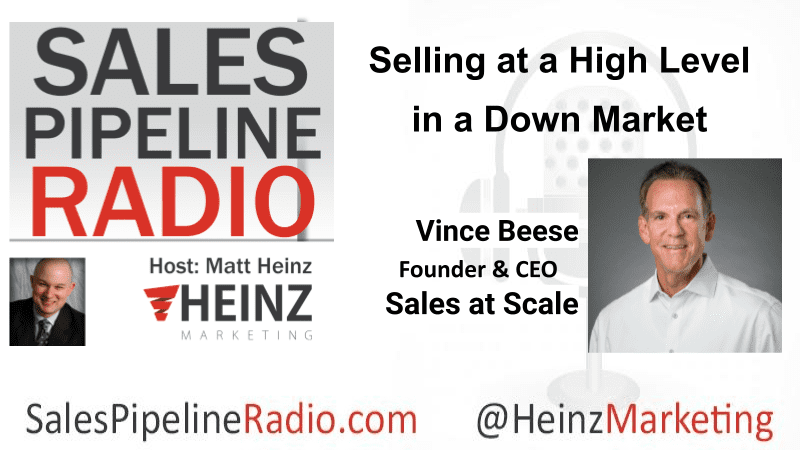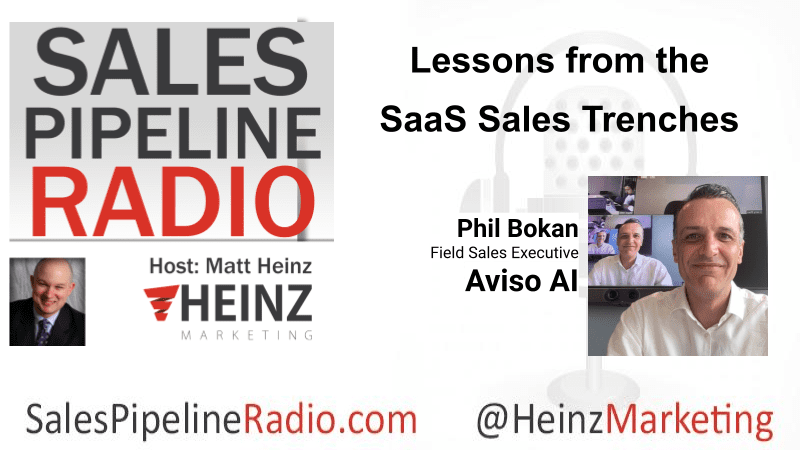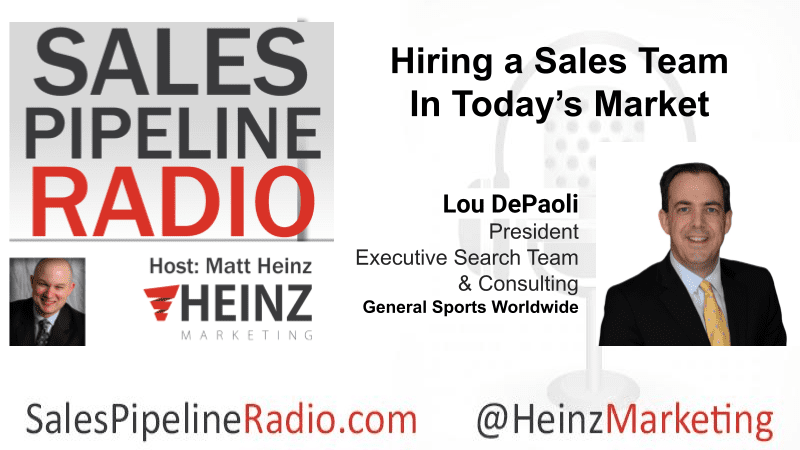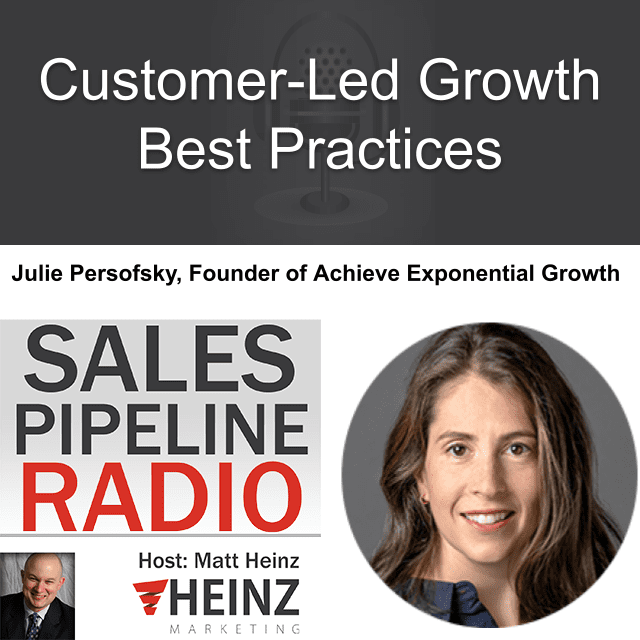Sales Pipeline Radio, Episode 349: Q & A with Vince Beese

Summary
Matt interviews the best and brightest minds in sales and Marketing on Sales Pipeline Radio.
By Matt Heinz, President of Heinz Marketing
If you’re not already subscribed to Sales Pipeline Radio or listening live Thursdays at 11:30 am PT on LinkedIn (also on demand) you can find the transcription and recording here on the blog every Monday morning. The show is less than 30 minutes, fast-paced and full of actionable advice, best practices and more for B2B sales and marketing professionals.
We cover a wide range of topics, with a focus on sales development and inside sales priorities. You can subscribe right at Sales Pipeline Radio and/or listen to full recordings of past shows everywhere you listen to podcasts! Spotify, iTunes, Blubrry, Google Play, iHeartRADIO, Stitcher and now on Amazon music. You can even ask Siri, Alexa and Google or search on Audible!
This week’s show is entitled, “Selling at a High Level in a Down Market” and my guest is Vince Beese, Founder & CEO at Sales@Scale and Sales HQ.
Tune in to Learn:
- 03:17 How to define enterprise deals and how it relates to the sales-marketing interplay
- 04:54 The importance of win rates in sales and having a thick skin.
- 06:58 Why the role of qualification in sales is crucial
- 09:41 How and why a new in-person co-selling sales community, Sales HQ is bringing back the energy of a physical sales floor.
Watch the video, listen in below and/or read the transcript below.
Matt: All right. Welcome everybody to another episode of Sale Pipeline Radio. I’m your host, Matt Heinz. Very excited to be here and to have you here, for this latest episode, as we get close to the end of 2023, I can’t believe we’re already now well into December.
Thank you so much for being part of our audience. Thank you very much for joining us live and making us part of your work week. And if you are listening or watching on demand, thank you so much for your continued downloads. Every episode of Sales Pipeline Radio, always available past, present, and future at SalesPipelineRadio.Com. Very excited to have with us today a longtime sales leader, sales executive, Vince Beese. Vince, thanks so much for joining us today.
Vince: Yeah, no problem, Matt. Thanks for having me. I appreciate it.
Matt: So we had a chance to catch up a couple of months ago and there were a few topics that came up that I definitely wanted to make sure that we were able to highlight on the show and so excited to have you here.
Maybe give people just really quick, just a little bit of your background and where you’ve been in the world of sales over your career.
Vince: Yeah. Most of my career is in early-stage tech startups, VC-backed tech startups from pre revenue to post revenue to exits. So, I love getting in early. I love building things.
So heading up sales, sometimes also handling marketing as well– all the revenue functions. I’ve turned that experience into my own consulting firm, which is Sales at Scale, where we not surprisingly help early-stage growth companies with go to market execution. And then, hopefully we’ll get to the next topic, which is also launched a a new company called Sales HQ.
Matt: I want to talk about all of that, especially I think the idea of bringing back the sales floor is a hot one for a lot of companies we’re talking to. You’ve run enterprise sales at a number of organizations, including customer and Meta, which is where Facebook is. You’ve covered a lot of ground, but the enterprise sale is a particular animal. Can you talk a little about the difference between saying, Hey, I do SaaS sales and I do enterprise SaaS sales. Why is that difference important?
Vince: It is. And it’s interesting even so more than that, Matt, when you’re at a startup, a SaaS startup, and you say you’re an enterprise sales is a different meaning than when you say you’re an enterprise sales at say Oracle, know what I’m saying?, so for the audience out there, let’s clarify when I use the word enterprise, I’m saying enterprise at a SaaS technology company, which is a different beast than Microsoft and Oracle. So the difference though, within SaaS and enterprise and SMB and mid market is not surprisingly, the enterprise deals, the cycles a lot longer, the complexity of the deal terms in general.
And then most importantly, the amount of people that you have to touch to convince and close a deal is a lot greater than others. And then the last piece of that is that, budgets tend to be bigger with enterprise and, it’s a little bit more scrutinized than, selling a solution that’s, $100 bucks a month or something like that. Right?
Matt: And oftentimes even in the best of markets, those enterprise deals take a little longer. You have to get more people to say, yes, you have to build that consensus building internally. We got a few other things I want to get to, but can you talk a little bit about what does it take to manage those enterprise deals? And in particular, like what’s the importance of the interplay between sales and marketing to create velocity and momentum in those deals?.
Vince: That’s a great question. First of all, I’d say anyone out there that says they want to be in enterprise sales, you better have thick skin because you could be working on, as six, nine, 12 months on a specific deal that’s six figures, seven figures and then all of a sudden it falls apart because someone left, budgets got slashed, whatever. It’s a lot of work. You have to persevere and have thick skin and top it out. It’s about quality, not quantity. You’re coming from emotion, that’s a lot faster, that’s something to be considered as well. But for me personally, I always liked going after enterprise size deals because they’re usually the strategic deals of the company. They’re typically the backbone of the company for growth, right?
Once you land one of those enterprise deals the value that it brings and the retention value as well. They typically stay a lot longer than smaller businesses that you sign. That’s number one, I think for people looking out there. But the other thing I really focused on when it comes to enterprise Sales.
The first and most important thing, Matt, is really nailing your ICP and nailing the qualification questions of why should we even talk, meaning, what is the pain that you have that we could potentially solve? And what’s the value of solving that? Because with enterprise, if you don’t pinpoint the pain, if you don’t really understand what’s driving this conversation and what’s driving the urgency, you’re just going to sputter and you’re not going to get anywhere.
Matt: Yeah. Totally agree with that. We’re talking today on Sale Pipeline Radio with Vince Beese. He is the founder and CEO of Sales at S cale and one of the things we had talked about when we caught up a couple of months ago was this topic of win rates and putting a focus on win rates.
And boy, what a better year to do that than 2023 when win rates seem to be down. I remember in the spring, there was some actual quantifiable data in the SaaS space showing just how dramatically win rates are down. I don’t know that they have rebounded yet. Why are win rates so important as a metric to watch?
Vince: I think it’s the only metric that matters quite frankly, because at the end of the day, if you’re not winning, you’re losing and we want to win more than we lose. The first thing I would recommend for folks out there, they haven’t done it to figure out what the win rate is. You got to do a funnel analysis, right?
You got to understand where deals are falling off and where deals are getting stuck. And Matt, we talked about this last time when I was at customer. We did this analysis and in one quarter, we increased our win rate tremendously because we figured out two things when did analysis. We figured out where we were getting stuck and we figured out why we were getting stuck.
And so the why was we weren’t getting to the IT leadership early enough in the sales process, meaning they were brought in late. And every time they were brought in late, we were falling off. And every time they were brought in late, we’re getting stuck in the first early stage of the opportunity.
So when we changed our structure, how we qualify and we made it a criteria to have IT leadership involved in the discovery and in those early stages our win rate dramatically increased. So yes, we had less opportunities, but we closed a higher percentage of opportunities. I think in that quarter I’m referring to, we went to something like a 42 percent increase in win rate.
Matt: I’ve heard some people say that there’s such a thing as too high of a win rate, that if your win rate is too high, you might be over qualifying opportunities and not putting enough into the pipeline. How do you know where the balance is and how to find or what is your optimal win rate to increase yield?
Vince: I’ve never heard of that before. I don’t know if you can over qualify. First of all, I do a very simple structure when it comes to qualifications. There’s a difference in qualification and discovery, right? Let’s just be clear on it. Yeah. My, my qualification criteria is very basic, right? For example, at Customer, it was, what is the pain?
Is there enough pain for them to leave? Cause it was a rip and replace type of solution. Is there enough pain for them to leave? Do they have commitment to the project? And do they have the commitment from IT? If we can solve that pain check and those other questions? Valid opportunity, create a stage zero opportunity.
That’s simple, right? To me, I never in my history overqualified because quite frankly, a zero-stage opportunity is a zero stage opportunity, right? It’s when the ticker starts, but let’s be honest, I haven’t even done discovery yet to see what specific use cases are and how we’re going to solve those and all that fun stuff. So it just gets us started.
Matt: You’re absolutely right about that. And I think this also just speaks to the importance of having those crisp definitions of what it means to be at those stages and in too many companies, either it doesn’t exist or its institutional knowledge that is applied inconsistently.
Marketing thinks elite is one thing. Sales think a real opportunity is another. They may both be wrong. And so just having a single point of truth and then evaluating that to your point of saying is this point of truth giving us the optimal yield and output from this pipeline? How do we make adjustments?
This isn’t a sales is right or marketing is right. This is a team sport approach. Talk about the cultural requirements to do that well in an organization so it doesn’t seem like a us versus them mentality.
Vince: Yeah, it’s all leadership, right? It’s leadership coming together and agreeing upon things and then leadership educating why that’s important to the sales organization and then making it a requirement tied to CRM. So once we were all on the same page, and once we communicated that, we then made the corrections in sales force to say, Hey, these are the criteria and you have to check these things off or you’re not advancing your opportunity.
And then it became a coachable moment. So then when we didn’t find things that should have been checked off, we would coach the sales person on that and why it’s important again. But let me be clear. I don’t think we ever corrected what marketing, got credit for, let’s say, and what was important to sales, right?
Like when we were handed a MQL was then our responsibility to decide if this was a SQL or not, right? Yeah. So that was a good transition, but then sales took over and had our own criteria, right? There wasn’t any argument or debate about it. It’s just what it was.
Matt: Yeah. There’s a lot of ways to do that, right? I think just, if you’re going to separate the leads from the opportunity, it’s just important to know exactly what’s what, right? And so just knowing that it’s a team sport, one, one team’s not going to be successful without the other.
We got a few more minutes today with our guest Vince Beese, who just a couple of months ago launched something I think it’s super, super interesting. It’s called Sales HQ. It is a co-selling community. An in-person community. Vince is bringing back the sales floor in a way that we maybe haven’t seen since the pandemic and honestly, I was excited when I heard that you were doing this because I’ve seen so many companies bringing, especially their BDR and inside sales teams back to the office to recreate the culture, the environment, the buzz and I’ve seen dramatic before and after results there. Talk about what you saw in the field and why Sales HQ is so exciting for you.
Vince: Let’s just agree upon this, Matt. I, I think both to sellers in general, whether it’s a BDR, SDR, account executive, sales director, et cetera, we all perform at a higher rate when we’re together because we feed off each other. We feed off the energy. I’m old enough to remember managing teams.
We had a sales floor and there was a buzz on the sales floor and there was an energy on the sales floor. And I say that because it was brought to my attention numerous times when I was starting this company Sales HQ that there’s people probably younger than 28 that may have never experienced the sales floor.
And they said, Hey Vince, you got to keep in mind when you talk to your audience, that they might not even know what you’re talking about. Like the concept of the gong, the concept of the standup. So what I’m trying to do is replicate the sales floor, replicate the buzz, the energy that we get and feed off each other and learn from each other.
I had someone yesterday tell me like, yeah, man I, when I started this company I got to sit next to this experienced sales executive and I used to listen to his calls in real time. I’d be writing notes while he’s on the call. I’ve learned so much in real time, he said, I don’t know how younger sellers do it today. You’d have to go through all these different gong calls, but in real time, it’s really impactful, isn’t it?
Matt: Yeah. I think that, we’ve gotten enamored with just the greater quote/ unquote efficiency of not having the office. And so going back to the office means I now have to staff the office. I got to put sodas in there somehow. I got to pay for the lights. I got to do all these things. And so I’m going to be devil’s advocate just to get a reaction, right? To say, okay, hey, you know what? I got Slack. I got to ring the bell channel. I got Zoom– we can do standups in Zoom everyone’s there. And then I get to work from the convenience of my basement and that may work for a product marketing manager. Talk about for those that have not carried a bag that have not had a sales role, have not experienced firsthand the sales floor. Why is that not sufficient?
Vince: I’m laughing because I’ll be honest with you, I joined a customer right when the pandemic kicked off and we did our best, like all their companies to celebrate wins. And like other companies, we use the Slack channel to celebrate. And again, not faulting a customer or Slack, but like celebrating a win in Slack, especially I’m talking about a six-figure type of deal. It’s lame, dude. It’s woohoo. Like emojis don’t get you excited. When you walk up and someone nails the gong and talks about the deal they won, you can feel the emotion in the room and what it does. You can feel that. So if you don’t know the difference there, then you’re not a high performing seller. You’re just not.
Matt: Yeah. I remember I remember working with a company. It was Post IPO company, but they were still scaling and they were selling into residential real estate agents and not only did they have a gong, but you were a new rep and you got your first sale, they had a portable gong that you carried around all three floors. It was exciting for the rep, but for everybody else, it was like you got cheered through accounting, cheered through engineering, you got it was a rallying moment for the whole company.
Vince: So we’re going to have for new members, we’re going to have the gauntlet and walk up songs, right? You’re going to come through and high fives and all that stuff. We’re going to have, of course, the gong for wins. We’re going to have the morning standups. These might not be my employees, but we’re all the same ilk. We’re all in this profession of sales together, and we’re all there to support and help each other.
So that’s what I’m trying to create. I’ve been passionate about this, honestly, Matt, since. 2018. But in 2018, the real estate market, the business real estate market was off the charts like a lot of areas. But now guess what? There’s lots of inventory out there to make this concept and more affordable to make the membership fees a lot lower because now real estate has come down. And by the way, the one thing I want to say about this place is that it’s a member-based fee and that your employer should pay for this because yes, part of its office space, but it’s also about career development, right? They’ll be training out of here and education and so on and so forth. So it’s not just about that. And at the end of the day, it should increase the performance of your employees, right?
Matt: There’s performance. There’s hitting your number and then there’s for your best rep keeping them, right? If you feel like you are being supported as a sales rep, not only to help your number, but also for a probably fairly nominal fee in the grand scheme of things to be part of a community of sellers in person. As we finish up here, I want to connect this conversation with something you said earlier. If you’re in enterprise sales, you better have thick skin. You can eliminate enterprise and you’re still right. Until I started this business 15 years ago, I’m a lifeline marketer, I had not had an actual sales job– last 15 years I very much have been in sales and you do have to have thick skin. You got to know that you’re going to get a lot of no’s before you get that ring the bell, ring the gong moment. My COO is now doing some active selling with me this year. And she made the comment the other day. And she’s I feel like I’m a dog and my owner’s drunk and just yanking me around and all these changes, new stages we didn’t know. I’m like, yeah, welcome to sales. It’s just what it is. And if you do that on your own, in your basement, that is very different than doing that with a community that understands what you’re going through, that you can do a rant on, or that it can give you some coaching or just pump you up to make that next call.
Sales is a very emotional job. It is a very strategic job. It is a very scientific job, but it’s also a very emotional job. So having that community beyond Slack, I think is critically important. So kudos for what you’re doing. So I know you’re starting out in a triangle. I’m in the Raleigh area, North Carolina. What are the plans to expand this?
Vince: Yeah. Look, if I can if I can nail this here, if we can get a good audience here, which I think we can, based on the initial reaction I’m getting, I think it makes sense in a lot of cities, like the size of Raleigh. Like I think of Kansas City. I had a bunch of people on LinkedIn, reach out to me, Indianapolis– I had a bunch of people reach out to me. So look, it’s a no brainer when people when I explain this to people like, wow, I’d to go in there. I wish I had one in Austin. Someone said to me, I said you might someday. So I think what we’re doing is co working when it’s specialized for your audience is going to work period end of story, right? Whether I do it or someone else does it. I think this is a concept and I’m not saying that people should be going back to the office 5 days a week, but I’m saying that 100 percent remote is not working. Some percentage in the office will do you good mentally and performance wise. So that’s what we’re trying to get people to understand is hybrids here to stay. It ain’t going away. So we know that you’ll be at a higher performance. And, the scenario you mentioned where either you had a bad call or a great call. What happens when you get off that call? You want to do one thing. You want to share it with somebody. And your partner might be at home, might be in another call and they’re you know what, “I’m not interested in that” and the dogs aren’t very good listeners, by the way, listeners, they don’t reply back.
Matt: So this is true. Yeah. They’re not great reciprocators in the way you need at that moment. If you’re in Raleigh and if you’re not, but you like this concept, check out. SalesHG.co to learn more about that initiative. And Vince, as we wrap up, where can people learn more from you and some of the other stuff you’re thinking and talking about?
Vince: LinkedIn is where I live. The good news is about my name. Vince Beese is there’s not many of us. I think I’m the only one on LinkedIn. If you want to continue this conversation and learn more about what I’m up to, you can find me on LinkedIn.
Matt: Awesome. Vince. Thank you so much. I’m really excited to get the chance to spend a little time with you. These topics were fun, very excited about getting the community back together in person. I’m looking forward to watching this grow for you.
Vince: Thanks, Matt. Appreciate it.
Matt: Thank you everyone for joining us for another episode of Sales Pipeline Radio. We will be back here next week for another episode, 11:30 am Pacific 2:30 Eastern, my name is Matt Heinz. We’ll see you next week on Sales Pipeline Radio.
Listen to the Latest Episodes:
Matt interviews the best and brightest minds in sales and Marketing. If you would like to be a guest on Sales Pipeline Radio send an email to Sheena@heinzmarketing.com.



